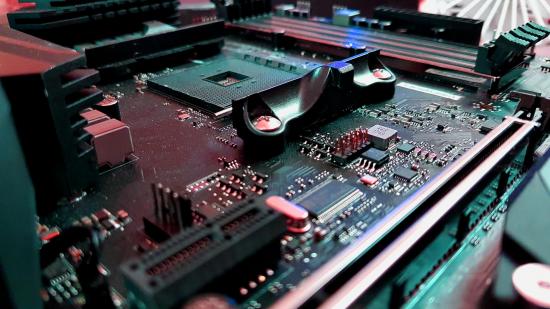PCIe 4.0 support has been added on some 400-series AMD motherboards in preparation for incoming AMD Ryzen 3000 CPUs. The new interface is being rolled out with AMD’s next-gen Ryzen CPUs and 500-series motherboards, but a little BIOS divination indicates even some 400-series boards will be able to make use of the extra bandwidth, too.
PCIe 4.0 increases bandwidth twofold over its prevalent predecessor, PCIe 3.0. That takes a full 16x PCIe 4.0 slot up to a total bandwidth of 64GB/s. Few graphics cards will ever put all that open road to good use, but there’s potentially a use in faster, more numerous NVMe drives as a result of the shift to the PCIe 4.0 standard.
And it looks like even those of you that opted for second-generation Ryzen processors will be able to make the most out of the increased bandwidth. As previously speculated earlier in the year, some connections on 400-series motherboards – those that run from the CPU directly and not the PCH – may be capable of running at higher speeds with a simple BIOS tweak once paired with a compatible Ryzen 3000 chip.
One such board is Gigabyte’s X470 Aorus Gaming Wi-Fi 7. An eagle-eyed redditor spotted the change to the BIOS after updating to BIOS version f40, which was released on May 16 bringing with it AGESA support for next-gen Ryzen CPUs.
Grab a board, any board: These are the best AMD gaming motherboards right now
Gigabyte is yet to officially confirm which motherboards will receive PCIe 4.0 support or to what extent, nor have any other motherboard manufacturer for that matter. Users are reporting Gigabyte B450 motherboards may also support PCIe 4.0 following the f40 BIOS update.
AMD Ryzen 3000 processors will maintain compatibility with today’s AM4 standard socket. That means you will be able to swap out your first- or second-gen Ryzen processor for the latest Zen 2 creation from the red team if you suffer from serious FOMO when launch day comes.
And that day is expected to roll around very soon, with AMD CEO Lisa Su expected to unleash Ryzen 3000 unto the world during the company’s Computex keynote on May 27.
AMD told Tom’s Hardware back at CES 2019 that it wouldn’t be locking down PCIe 4.0 support for older boards. This offers motherboard manufacturers the freedom to ‘unlock’ this functionality with 300- and 400-series motherboards as and when they see fit to do so. Not all Ryzen mobos will support, nor be capable of, PCIe 4.0, however.
We won’t know exactly how well PCIe 4.0 devices play with older motherboards until AMD’s Zen 2 chips are out in the wild.
AMD Navi graphics cards are expected to bring PCIe 4.0 support into the mix at launch later this year, though are very unlikely to get close to saturated the bandwidth on offer, and we’re also expecting NVMe M.2 SSD drives capable of breaking the 4GB/s barrier to sprout up over the next six months.
With PCIe 4.0 potentially becoming ubiquitous with 400-series motherboards, AMD’s X570 chipset is in need of further functionality to make it a strong proposition to discerning gamers. Whether it’s 16-core CPU support or something else entirely, you don’t go sticking fans on motherboards without good reason… right?
